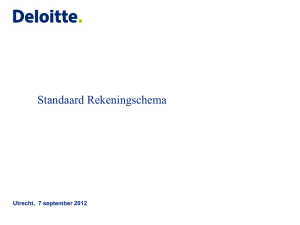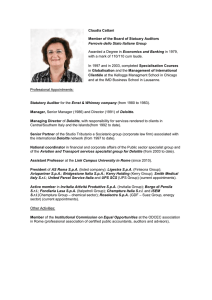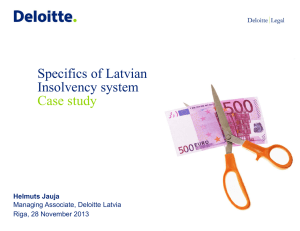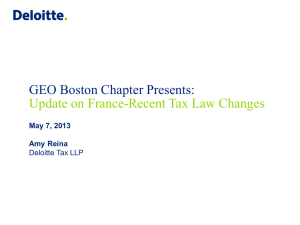BU - DT Tax Presentation_2012
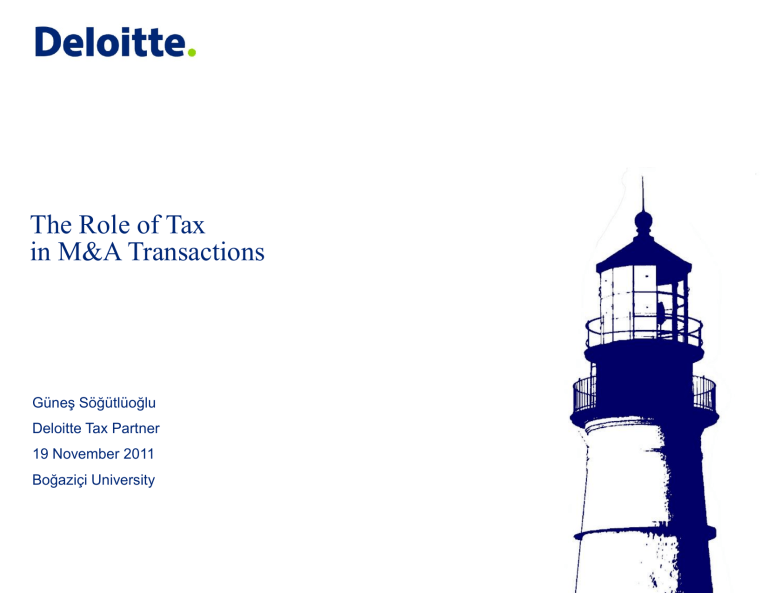
The Role of Tax in M&A Transactions
Güneş Söğütlüoğlu
Deloitte Tax Partner
19 November 2011
Boğaziçi University
Albert Einstein
The hardest thing in the world to understand is the income tax.
Jewish Proverb
Taxes grow without rain.
Winston Churchill
There is no such thing as a good tax.
Albert Einstein
[on filing for tax returns] This is too difficult for a mathematician. It takes a philosopher.
John Maynard Keynes
The avoidance of taxes is the only intellectual pursuit that carries any reward.
Barry Goldwater
The income tax created more criminals than any other single act of government.
English Proverb
Nothing is certain but death and taxes.
Will Rogers
The difference between death and taxes is death doesn't get worse every time Congress meets.
Mark Twain
The only difference between a tax man and a taxidermist is that the taxidermist leaves the skin.
Jean-Baptiste Colbert
The art of taxation consists in so plucking the goose as to obtain the largest amount of feathers with the least amount of hissing.
2 © 2011 Deloitte Touche Tohmatsu Limited
3
Accounting
© 2011 Deloitte Touche Tohmatsu Limited
4
Role of Accounting Professionals and Tax Auditors
Until June 1989, there were no regulations in Turkey related to the accounting profession. The Law of Certified Public Accountancy and Sworn Financial Advisory
(Law No. 3568) basically defines the profession and indicates the rights and responsibilities of professionals. Certain transactions and documentation require certification by Sworn Financial Advisors.
Inspections for tax purposes are carried out by government tax inspectors under the supervision of the Ministry of Finance. The period of statute of limitations for tax inspections is five years.
© 2011 Deloitte Touche Tohmatsu Limited
5
• Major Tax Laws
•Taxation of Mergers & Demergers
•Tax Due Diligence
• Acquisitions
• Restructuring
6
Major Tax Laws
7
A. Major Tax Laws in Turkey
1. Tax Procedural Code
The provisions of this law apply to all taxes and dues included in the General Budget
(i.e., except the customs duties), and to taxes, dues and charges collected by the special administrations of the provinces and municipalities.
The law determines the general principles of taxation for all taxes including the responsible authorities, the definition of tax payer and liability, the methods of tax assessments, the statute of limitations, the methods of corrections, tax audit and investigations, accounting and documentation requirements, tax penalties, settlement procedures etc.
8
2. Corporate Income Tax
In Turkey, income and earnings of corporations, limited liability companies, Turkish branch offices of foreign firms, joint ventures, cooperatives and public enterprises are subject to corporate income tax. State Economic Enterprises and trading bodies of foundations and associations are also regarded as corporate income taxpayers and subject to corporate income tax.
2.1. Taxable Income
Taxable corporate income is determined by taking into consideration all businessrelated expenses, income, tax losses and deductions in accordance with the provisions of Articles 8, 9, 10 and 11 of the new Corporate Income Tax Law.
2.2. Corporate Income Tax Rates
Effective from 1 January 2006, the Turkish corporate income tax rate is reduced from
30% to 20%. Please refer to Table 2.5 for a computation of the tax burden of a resident corporate income taxpayer assuming that profit is distributed.
2.3. Dividend Withholding Tax
With effect from 23 July 2006, the dividend withholding tax rate is increased from 10% to 15% on distributions of profit to non-resident shareholders and amounts repatriated by a branch to its head office. Dividends distributed by a resident Turkish entity to another resident Turkish entity continue to be exempt from dividend withholding tax.
9
Corporate Income
Corporate Income Tax (20%)
Net Income After Corporate Income Tax
Dividend Withholding Tax (15%)
Total Tax Burden
Net Profit After Taxes
80
-12
32
68
TL
100
-20
3. Individual Income Taxation
In general, individuals residing in Turkey are liable for personal income tax on all of their income derived in and outside Turkey. However, individuals who do not reside in Turkey but receive part of their income from Turkey are liable for income tax only on their income derived in Turkey. The former is known as “full liability taxpayers”, and the latter as “limited liability taxpayers”.
Progressive income tax rates apply at rates varying from 15 to 35%.
3.1. Taxable Income
Types of Income
Income tax is levied on the following types of income:
• Business profits (Commercial Income)
• Agricultural profits
• Salaries and wages (defined further below)
• Income from professional services (such as services rendered by lawyers, tax consultants, engineers etc.)
• Income from immovable property (mainly rental income)
• Income derived from securities (interests, dividends)
• Other income (capital gains and nonrecurring income)
10
4. Value Added Tax
Value Added Tax (VAT) is levied on goods delivered and services rendered in connection with commercial, industrial, and agricultural activities and professional services in Turkey, as well as on goods imported and professional services received from abroad. Persons who deliver such goods or perform such services are liable for VAT. In general, VAT arises when a service is performed, goods are delivered or an invoice is issued prior to delivery of goods or, in the case of imports, when import clearance document is filed with the Customs
Authority.
The standard VAT rate is 18%. Lower VAT rates or exemptions may apply to certain goods and services.
11
12
5. Special Consumption Tax (SCT)
SCT is an indirect tax (excise tax) which has been introduced with effect from 1 August
2002. Unlike VAT, SCT is applied only at once by the party that becomes liable as a result of occurrence of the taxable event for the particular types of products as specified in the lists attached to SCT Law. Thus, SCT constitutes a cost for those parties who are not held liable to calculate and declare such tax however, incur the cost of SCT on their purchases from those taxpayers who are liable to calculate SCT on their deliveries.
SCT is applicable to only certain types of goods specified and enumerated in the lists attached to the SCT Law. There are four lists of products attached to the SCT Law.
• List I: Natural gas, petroleum products and various kinds of solvent products and byproducts
• List II: Vehicles
• List III: Cigarettes, tobacco products, alcoholic drinks, non-alcoholic beverages
• List IV: Durable consuming goods and luxury goods such as cosmetics, perfumes, white goods like refrigerators, washing machines etc., electronic appliances like recorders, television etc.
The Council of Ministers is authorized to change the rates of SCT, impose fixed amounts of SCT instead of proportional taxation in accordance with the SCT Law.
13
6. Other Taxes
• Stamp Duty
• Property Tax
• Inheritance and Transfer Taxes
• Motor Vehicles Tax
• Bank and Insurance Transaction Tax
• Special Communication Tax
• etc
14
Taxation of
Mergers &
Demergers
Merger
• In case one or more corporations merge with another corporation, the profit acquired by the dissolving corporation as part of the merger shall be subject to the provisions on liquidation.
• Profit arising from the merger, shall be subject to corporate tax. Accordingly, operational profits, as well as the capital gains, derived by the dissolving company before the date of the merger shall be subject to corporate taxation.
•
In calculating the profit arising from the merger, the values of the assets transferred from the acquirer company to the shareholders of the dissolving company shall be determined in accordance with the provisions of the Corporate Tax Code on disguised profit distribution through transfer pricing.
15
Merger
• With regard to these types of mergers, which are also referred to as taxable mergers, profit arising from the mergers shall be determined in accordance with the provisions on the determination of liquidation profit. The assets, which have been directly or indirectly transferred from the acquirer company to the owners or the shareholders of the dissolving company, shall be treated in the same manner as the assets allocated to the shareholders in case of liquidations.
• The assets transferred from the dissolving company shall be appraised in accordance with the provisions of the Tax Procedures Code.
• Responsibilities and liabilities imposed on the liquidating agents in case of liquidations shall be imposed on the acquirer company in case of the mergers.
16
Tax-Free Mergers
Tax-free mergers have been characterized in the first two paragraphs of the Article
19 of the Corporate Tax Code. Hereunder, mergers conducted between corporations resident in Turkey shall qualify as a tax-free merger provided that the items in the balance sheet of the dissolving company at the date of the merger are consolidated, as a whole, to the post-merger balance sheet of the transferee company at their registered values. Mergers that satisfy the following conditions shall be regarded as tax-free mergers:
• Either the registered head office or the administrative center of both the dissolving and the acquirer company is required to be located in Turkey.
• The items in the balance sheet of the dissolving company at the date of the merger are required to be consolidated, as a whole, to the post-merger balance sheet of the transferee company at their registered values.
Date of the merger refers to the date on which the decree regarding the merger issued by the authorized body of the corporation was registered to the Trade
Registry.
Any changes to occur in the legal entity type of the corporations, which have been executed in accordance with the conditions specified above shall be subject to the same provisions as the tax-free mergers.
17
Tax-Free Mergers
• In cases where a corporation executes a tax-free merger with any of its participations or with another corporation that holds the shares of the acquirer company, the capital increase in the acquirer following the merger shall be realized deficiently by the value of these participation shares. This shall not breach the provisions of the Article 19 of the Corporate Tax Code.
• In case the amount in the participations account does not overlap with the nominal value of the participation shares, the difference, either positive or negative, between these two amounts can be reserved in provisional accounts without being associated with the corporate tax base. The concerning difference can also be written-off without being associated with the corporate tax base.
18
19
Demerger
Full Demerger
• Transactions, in which a company resident in Turkey dissolves, through transferring all of its assets, receivables and liabilities to two or more equity companies, either incorporated or to be incorporated, at their registered values and the shareholders of the dissolving company obtain participation shares issued by the transferee company in return, are regarded as full demergers from the perspective of Corporate Tax Code applications.
• In such cases, the assets of the dissolving company are transferred to two or more companies, and the shareholders of the dissolving company obtain participation shares issued by the transferee companies.
• Up to 10 % of the nominal values of the shares to be obtained by the shareholders of the dissolving company can be funded in cash. Thereby, cash payments of immaterial amounts to be executed for the purpose of closing the accounts do not prevent the transaction from being regarded as a demerger.
Demerger
Full Demerger
• Assets of the dissolving company shall be transferred at their registered values.
Pursuant to the Article 265 of the Tax Procedures Code, registered value refers to the value indicated in the accounting records.
• The concerning assets shall be transferred to the accounts of the transferee companies at their registered values as well. In that sense, demerger can be accepted as a tax deferral method. In case the transferee disposes of the assets, which were acquired as part of the demerger, in the future, the positive difference between the sales price and the registered value of these assets shall be subject to corporate taxation.
• In demergers, valuation accounts in the balance sheet are required to be transferred together with the accounts they are associated with.
20
Demerger
Partial Demerger
• As per the Article 19 of the Corporate Tax Code, partial demerger refers to the transfer of the immovable properties, or the participation shares which have been held for a period longer than 2 years, or one or more of the production or service enterprises of an equity company resident in Turkey; or the business place or the permanent representative of a non-resident equity company; to an equity company, either incorporated or to be incorporated, resident in Turkey as capital in-kind at their registered values.
• In order for the participation shares to be transferred as capital in-kind within the context of a partial demerger, the concerning shares are required to have been held for a period no less than 2 years.
•
In partial demergers, the balance sheet accounts required to be transferred together with the accounts they are associated with.
21
Transfer of Production and Service Enterprises as Capital in-Kind
• In cases where production and service enterprises are transferred within the context of a partial demerger, assets and liabilities that are essential in terms of maintaining the operations and preserving the integrity of the enterprise are required to be handed over to the transferee as a whole.
•
In partial demergers, both the transferor and the transferee is required to be able to maintain their business operations following the transaction. Therefore, regarding the transfer of enterprises within the context of a partial demerger, the assets including but not limited to the immovable properties, facilities, machineries, equipments, tools, instruments, vehicles, intangible rights, raw materials, semi-manufactured and manufactured inventories as well as the liabilities associated with the concerning assets that are essential in terms of maintaining the operations and preserving the integrity of the enterprise are required to be handed over to the transferee as a whole.
22
Cases in which the Participations Shares are Issued to the
Shareholders of the Transferor
• In partial demergers, the shares acquired in exchange for the transfer of the assets can either be retained by the transferor or be issued to the shareholders of the transferor.
However, in cases where the shares, which were acquired in exchange for the transfer of the immovable properties or participation shares within the context of a partial demerger, are issued to the shareholders of the transferor, liabilities associated with the concerning immovable properties and participation shares are obliged to be transferred as part of the partial demerger as well.
23
Share Exchange
• Pursuant to the Article 19 of the Corporate Tax Code, share exchange refers to a transaction in which an equity company resident in Turkey takes over the participation shares of another equity company such that the former takes control of the management and acquires the majority of the shares of the latter and hands over its own participation shares in return. In order for such transaction to be tax-free, the company taking over the participation shares is required to take control of the management and acquire the majority of the shares of the opposite company. Up to 10 % of the nominal values of the shares to be handed over to the opposite company can be funded in cash. This shall not prevent the transaction from being regarded as a share exchange.
24
Hisse Değişimi Örneği (Exchange of Shares)
© 2011 Deloitte Touche Tohmatsu Limited
Hisse Değişimi Örneği (Exchange of Shares)
• Şirket A, İştirak 2’deki hisselerini
Şirket B’ye devreder.
• Akabinde, Şirket B sermaye artırımına gider. Arttırılan sermayeyi temsil eden hisse senetleri Şirket A’ya verilir.
• İşlemin hisse değişimi olarak değerlendirilmesi için, Şirket B’nin,
İştirak 2’nin hisse çoğunluğunu ve yönetimini ele geçirmesi gerekmektedir.
© 2011 Deloitte Touche Tohmatsu Limited
Taxation and Declaration in case of Tax-Free Mergers
• In case of tax-free mergers executed in accordance with the Article 19 of the Corporate
Tax Code, only that portion of the income derived by the dissolving company which had accrued prior to the date of the merger shall be subject to corporate tax. Income arising from the merger shall neither be calculated nor be subjected to corporate taxation.
• The income derived by the dissolving company which had accrued prior to the date of the merger shall be included in the corporate tax return to be jointly prepared by the acquirer and the dissolving company as of the date of the merger. Income deriving from the operations to be conducted after the date of the merger shall be regarded as the income of the acquirer.
27
Taxation and Declaration in case of Tax-Free Mergers
• In cases where the tax-free merger is executed during the period between the last month of the fiscal year and end of the month on which the corporate tax return for the preceding fiscal year is required to be submitted, the corporate tax return submitted by the dissolving company during the preceding fiscal year is required to be attached to the corporate tax return to be jointly prepared by the acquirer and the dissolving company as of the date of the merger. Both of these returns are required to be jointly signed and submitted to the tax office to which the dissolving company is affiliated.
• The acquirer company is obliged to guarantee through a commitment letter, which is required to be attached to the corporate tax return prepared in connection with the merger, that it shall pay the tax liabilities, either accrued or to be accrued, of the dissolving company and that it shall fulfill other liabilities imposed on the dissolving company as well.
28
Taxation and Declaration in case of Full Demergers
• In case of full demergers executed in accordance with the Article 19 of the Corporate
Tax Code, only that portion of the income derived by the dissolving company which had accrued prior to the date of the demerger shall be subject to corporate tax. Income arising from the demerger shall neither be calculated nor be subjected to corporate taxation.
• The income derived by the dissolving company which had accrued prior to the date of the demerger shall be included in the corporate tax return to be jointly prepared by the transferee and the dissolving company as of the date of the demerger. Income deriving from the operations to be conducted after the date of the demerger shall be regarded as the income of the transferee.
29
Taxation and Declaration in case of Full Scale Demergers
• In cases where the demerger is executed during the period between the last month of the fiscal year and end of the month on which the corporate tax return for the preceding fiscal year is required to be submitted, the corporate tax return submitted by the dissolving company during the preceding fiscal year is required to be attached to the corporate tax return to be jointly prepared by the transferee and the dissolving company as of the date of the demerger. Both of these returns are required to be jointly signed and submitted to the tax office to which the dissolving company is affiliated.
• The transferee is obliged to guarantee through a commitment letter, which is required to be attached to the corporate tax return prepared in connection with the demerger, that it shall pay the tax liabilities, either accrued or to be accrued, of the dissolving company and that it shall fulfill other liabilities imposed on the dissolving company as well.
30
Taxation in case of Partial Demergers and Exchange of
Shares
• The income arising from the partial demergers and exchange of shares executed in accordance with the Article 19 of the Corporate Tax Code shall neither be calculated nor be subjected to corporate tax.
• In case of partial demergers, transferee shall be jointly and severally liable for the tax liabilities, either accrued or to be accrued as of the date of the partial demerger, of the transferor at an amount limited to the market value of the assets which were transferred within the context of the partial demerger.
31
32
Tax Due
Diligence
Risk and Opportunity Analysis
I
APPLICATIONS
II
RİSKS
•Tax returns
• Analysis of financial statements
• Sworn financial advisory reports
• Assessment of tax position
• Effective tax burden
• Tax inspections
• Tax litigations
• Tax base calculations
• Risky transactions
• Intra-group transactions
• Major transactions
• Relations with the tax authority
• Competence of the personnel
• Accounting applications and business processes
• Tax processes
IV CONCLUSION
Where are we?
What might happen?
III
OPPORTUNITIES
• Tax incentives
• Tax refunds
• Fiscal losses
• Tax exemptions
• Tax exclusions
• Tax deviations
• Restructuring
• Financing methods
• Effects of the shareholder structure
• Tax planning
What should happen?
33
The issues come accross during a tax due diligence
RISKS
•Hidden profit distribution through transfer pricing and thin capitalisation
•Difference in opinion regarding tax exemptions and exclusions
•Unrecorded transactions in sales and payrolls
•The use of falsified documents to increase the expenses
•Related party structuring and invoicing for
VAT, SCT and CIT purposes
•Stamp duty on agreements
•Timing differences in income and expense accruals
•Errors in costs, depreciation and valuations
•Incorrect withholding tax applications
•Errors in tax rates, tax base calculations, additions and deductions
OPPORTUNITIES
•Incentives that are currently regulated by various different laws
•Tax exemptions and exclusions provided in various tax laws
•The use of prior year tax losses as a tax shield in the future
•The collection of tax refunds on a timely and accurate basis
•Related party structuring in the absence of tax consolidation
•The tax effects of shareholding structure for dividend distributions
•Overpaid and unneccasry tax payments
•The selection and application of financing alternatives
34
35
Acquisitions
The structure of transaction
•
•
•
•
•
•
•
•
•
•
Asset or share deal
The party who is considered as the seller
Goodwill
The evaluation of tax treatment
Direct Tax implications
Indirect Tax implications
The evaluation of past tax liabilities
The avoidance of risks through asset deal
The place and importance of tax due diligence in share deal transactions
The safeguards/precautions that could be taken (i.e., SPA, reps and warranties, escrow accounts, sale price adjustments etc)
36
37
Restructuring
•
•
•
•
Examples
Downstream Merger
Sideways Merger
Partial Demerger
Comprehensive Structures
38
39
Downstream Merger - Step 1
40
Downstream Merger (Cont’d) – Step 2
41
Downstream Merger (Cont’d) - Step 3
Downstream Merger (Cont’d) - Final
42
43
Sideways Merger - Step 1
44
Sideways Merger - Step 2
45
Sideways Merger - Step 2
46
Sideways Merger - Final
Partial Demerger – Step 1
47
Partial Demerger – Step 2
48
Partial Demerger – Final
49
Comprehensive Structures – Step 1
50
Comprehensive Structures – Step 2
51
Comprehensive Structures – Step 3
52
Comprehensive Structures – Step 4
53
Comprehensive Structures – Final
54
Hisse Değişimi Örneği (Exchange of Shares)
© 2011 Deloitte Touche Tohmatsu Limited
Hisse Değişimi Örneği (Exchange of Shares)
Hisse Değişimi Öncesindeki Yapı
© 2011 Deloitte Touche Tohmatsu Limited
Emisyon Primi (Share Premium)
Aşamalar:
1 – TurCo1 banka kredisi alır
Kredi Geri Ödemesi
Banka
Kredi
TurCo1
100%
Minimum Sermaye +
Emisyon Primi
TurCo2
Dağıtım
2- TurCo2 minimum sermaye ve emisyon primi ile kurulur
3 – TurCo2 nakdi hedef şirket hisselerini satın almak için kullanır
100%
Hedef
4 Hedef (bankasında yüksek nakide sahip) TurCo2 ile vergisiz devir yoluyla birleşir
Vergisiz Devir
5 – Birleşme sonrasında emisyon primi TurCo1’e dağıtılır
6 – TurCo1 kredi borcunu kapatır
© 2011 Deloitte Touche Tohmatsu Limited
© 2011 Deloitte Touche Tohmatsu Limited
